Share On Social!
Latino and African American youth as well as individuals belonging to a local coalition of health leaders joined forces to launch Open Truth, a counter-advertising campaign that exposes big soda companies’ marketing tactics aimed at youth and communities of color. The result was a series of poems and videos created by youth, as well as dozens of ads viewed by millions, a website, and a viral social media campaign aimed at getting those targeted by soda companies to speak out against Big Soda.
EMERGENCE
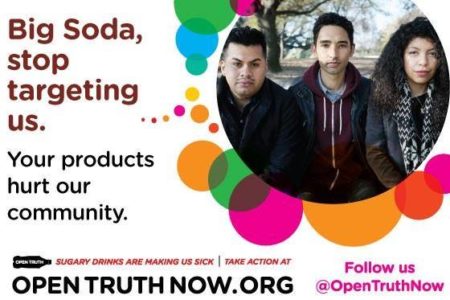
Awareness: By 2008, Christina Goette of the San Francisco Public Health Department and Shape Up San Francisco (Shape Up SF), a coalition of community groups and leaders interested in preventing chronic disease and promoting better health for the region, were already very concerned about the rise in type 2 diabetes.
Health advocates weren’t the only ones concerned.
With family members suffering from type 2 diabetes, young African American and Latino youth like Obasi Davis, Gabriel Cortez, Monica Mendoza, and Yosimar Reyes were also starting to experience the negative effects of obesity and sugary drinks in own their lives.
Just one fruit drink, regular soda or energy drink contains more added sugar than most should consume in a day, according to the World Health Organization. Drinking just one to two sugary drinks a day increases your risk of type 2 diabetes by 26%.
Learn: In 2013, beverage companies spent $866 million to advertise sugary drinks in ways associated with feelings of fun and happiness.
Shape Up SF’s local research showed that residents living in the predominantly Latino and African American neighborhood of Bayview Hunters Point in California (the 94124 zip code) experienced the highest rates of type 2 diabetes.
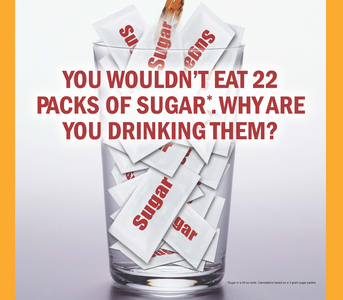
They also found that corner stores in this area were hotspots for advertisements and high sales of junk food and soda.
“Beverage companies are increasingly targeting youth of color,” said Marianne Szeto, staff to Shape Up SF Coalition. “We found very devastating quotes from soda industry executives about how youth of color is their future growth market.”
To get a better handle on what folks from this community had to say, Shape Up SF held focus groups among youth and minority groups.
“What we heard from these focus groups was ‘we don’t like that the [soda] industry targets us,’” Goette said.
Frame Issue: So at that time (2008), Shape Up SF led a collaborative effort to expand Alameda County’s 10-week Soda Free Summer challenge to five bay area counties: Contra Costa, Marin, San Francisco, San Mateo and Santa Clara. Through this initial campaign, partners worked to motivate and encourage residents to drink water instead of soda (for at least 10 weeks) during the summer.
Two more educational campaigns, Rethink Your Drink and Choose Healthier Drinks, followed.
These efforts proved to public health officials that poster ads, booklets, websites, and displays could increase community awareness about the high sugar content of soda, energy drinks, and sports drinks.
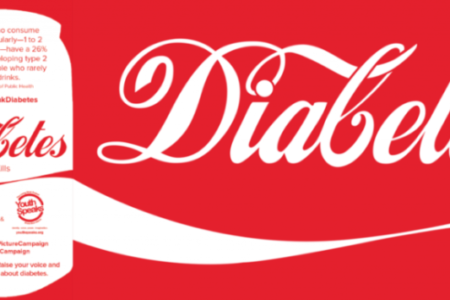
But with the soda industry increasingly targeting communities of color, Shape Up SF and partners felt the time to take a campaign to the next level was now.
“It was time for us to look at a broader campaign” similar to social marketing strategies used during the 80s and 90s, in tobacco prevention campaigns; to shift the blame from the individual and look at the context in which behaviors are happening,” Goette said.
DEVELOPMENT
Education: In 2013, Shape Up SF partnered with The Bigger Picture Project (an initiative to empower youth change that is co-led by the University of California San Francisco [UCSF] Center for Vulnerable Populations and non-profit Youth Speaks) to hold a series of four educational workshops for talented young poets.
They hoped to foster a creative outlet for people to voice their concerns about the harmful effects of sugary drinks and type 2 diabetes.
At one of the workshops, a half a dozen young adults came together to learn about the root causes of obesity and type 2 diabetes and soda industry marketing in their communities from professionals from Shape Up SF and UCSF. Professional poets, such as The Bigger Picture’s Jose Vadí, led writing sessions and interacted with the youth poets to help refine their work.
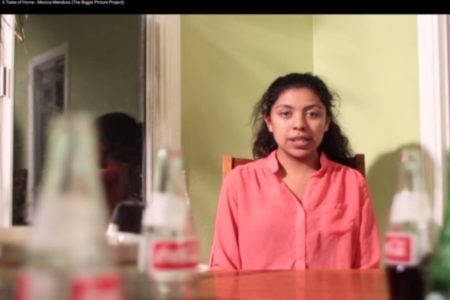
Gabriel Cortez, who now works with Youth Speaks, attended this workshop.
“Youth involvement in many conversations is a gap,” Cortez said.
Mobilization: Cortez, Davis and the other poets, were inspired by the workshop to highlight the burden of sugary drinks on communities of color.
“That’s where my poem ‘Perfect Soldiers’ came from,” said Cortez. “For me it was one of the fastest poems I’ve ever written…I think we already had the sense of the issue, but learning about the huge numbers was really a big part of activating us.”
Also out of these workshops came four YouTube videos: Lost in Translation, A Taste of Home, Targets, and Perfect Soldiers. The videos were shared on social media and the poems that serve as the basis for these videos are performed live at community events.
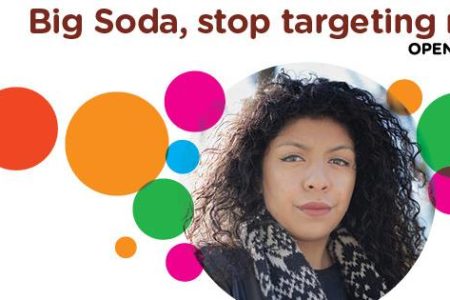
“Everybody who heard the poems was affected by them,” Goette said.
Debate: With their poems now being heard throughout the city, region, state and nation, it was apparent that Latino and African American youth should be the driving voice behind this important message, Goette said.
Shape Up SF and The Bigger Picture wanted to feature the faces of youth poets in bigger, more viral ads. They convened a group that included health departments from neighboring counties—Alameda and Sonoma County, as well as the American Heart Association of the Bay Area and UCSF to create a campaign centered on the messages and voices developed by the Bigger Picture youth poets.
This is when Katie Kleinsasser, co-founder and president of Your Message Media, joined the project.
“There are so many campaigns that tell young people what to do,” said Kleinsasser. “By giving a platform to youth voices, this one [campaign] would do just the opposit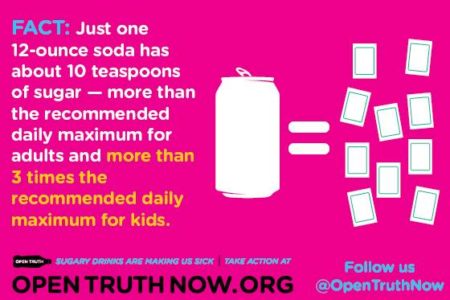 e of that.”
e of that.”
ENACTMENT
Activation: With the help of Kleinsasser’s social marketing experience, the group developed messaging for the Open Truth campaign.
How did the group come up with the name Open Truth?
“We took the words right out of Coke’s mouth,” Kleinsasser said.
Coca-Cola markets soda through its Open Happiness campaign. Because the campaign sought to expose negative health consequences associated with soda and sugary drinks, they chose to name it Open Truth.
“We wanted to get the science out there in a way that was factual and thorough, but also in a relatable way that had a very human element,” Kleinsasser said.
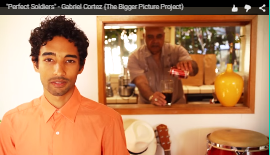
Frame Policy: The campaign was created to be viral on social media, Goette said, so it needed its own splashy webpage and social media channels. On the webpage, visitors can learn the truth about sugary drinks and their link to type 2 diabetes, tooth decay, heart disease, cancer, obesity, sexual dysfunction, and premature death.
In addition, they wanted people to know how Big Soda companies use the three Ms (Marketing, Money, and Misinformation) to target Latino and African American youth with their message.
Finally, one of the most important pages on the website would be the Take Action page. This page would provide visitors with different five ways they could get Big Soda companies to stop targeting youth of color, including:
1. Tweet or email big soda executives;
2. Communicate with local leaders;
3. Share these videos on social media;
4. Learn about sugary drink legislation in California; or
5. Learn about common sense labels on drinks.
Change: On January 12, 2015, Shape Up SF officially launched the Open Truth Campaign through ads in the community, a website, and on social media sites including Twitter, Facebook and Instagram.
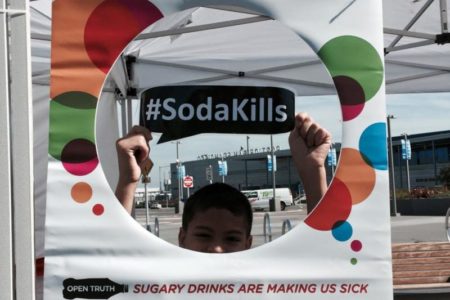
The team was able to pool together funds to buy several billboards and poster ads thanks to support from the, the Alameda Department of Public Health, the Sonoma County Department of Health Services, Metta Fund, and Kaiser Permanente.
IMPLEMENTATION
Implementation: Open Truth ads first appeared on BART trains and cross-bay AC transit buses. Then, nearly a dozen corner stores, delis, bakeries, taquerías and other businesses in the Bayview Hunters Point neighborhood put Open Truth posters inside their stores.
Five large billboard ads were also placed alongside busy avenues with high flow of traffic in the neighborhood, and 15 poster ads were placed at bus shelters for three months.
San Francisco’s Municipal Transportation Agency’s buses also donated ad space, which provided 30 more ads placed outside of MUNI buses and two thousand placards inside buses that travel throughout the city. Over the course of two and a half months, Goette estimates that the Open Truth ads reached over 12 million viewers.
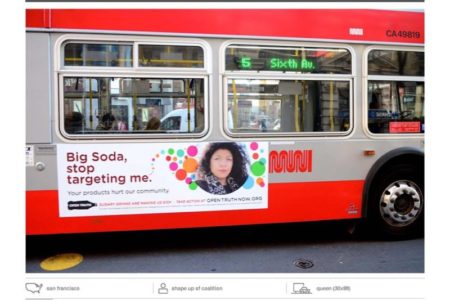
Equity/Sustainability: Although initial funding for billboard and street ads has since expired, the Open Truth website and social media channels remain active.
“Our hope was and still is that the Open Truth campaign will be used by others across the country,” Goette said.
Through his involvement with Youth Speaks and the Bigger Picture project, Cortez continues to speak at local schools and community events. In October 2014, Cortez performed his poem Perfect Soldiers at the Berkeley vs. Big Soda headquarters, in support of Berkeley’s recently passed soda tax.
Thanks to new funding from the California Health Care Foundation and the Small Planet Fund, the Open Truth campaign is being transcreated (translated in a manner that retains its original meaning and message) into Spanish and should be up and running by fall 2015.
Additional Links:
Shape Up San Francisco’s About the Open Truth Campaign
The Open Truth campaign and Bay Area Youth Confront Soda Industry in Fight Against Diabetes
The Bigger Picture Website
Soda Free Summer Tools and Resources
Shape Up SF’s Rethink Your Drink Campaign
Choose Healthier Drinks Campaign
Bigger Picture Videos: Lost in Translation, A Taste of Home, Targets, & Perfect Soldiers.
Youths leading fight against sugary drinks
Poets Give Voice To The Toll Of Type 2 Diabetes
This success story was produced by Salud America! with support from the Robert Wood Johnson Foundation.
The stories are intended for educational and informative purposes. References to specific policymakers, individuals, schools, policies, or companies have been included solely to advance these purposes and do not constitute an endorsement, sponsorship, or recommendation. Stories are based on and told by real community members and are the opinions and views of the individuals whose stories are told. Organization and activities described were not supported by Salud America! or the Robert Wood Johnson Foundation and do not necessarily represent the views of Salud America! or the Robert Wood Johnson Foundation.
ABOUT THE PROGRAM
Salud America! The RWJF Research Network to Prevent Obesity Among Latino Children is a national program of the Robert Wood Johnson Foundation. The program aims to educate researchers, decision-makers, community leaders, and the public in contributing toward healthier Latino communities and seeking environmental and policy solutions to the epidemic of Latino childhood obesity. The network is directed by the Institute for Health Promotion Research at the University of Texas Health Science Center at San Antonio.
For more information, visit http://www.salud-america.org.
By The Numbers
1
Supermarket
for every Latino neighborhood, compared to 3 for every non-Latino neighborhood
This success story was produced by Salud America! with support from the Robert Wood Johnson Foundation.
The stories are intended for educational and informative purposes. References to specific policymakers, individuals, schools, policies, or companies have been included solely to advance these purposes and do not constitute an endorsement, sponsorship, or recommendation. Stories are based on and told by real community members and are the opinions and views of the individuals whose stories are told. Organization and activities described were not supported by Salud America! or the Robert Wood Johnson Foundation and do not necessarily represent the views of Salud America! or the Robert Wood Johnson Foundation.



